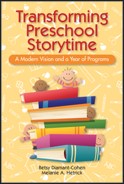Repeating A Book In Different Ways
Given that children learn best through repetition, the best way to forge new connections in the brain is by building on something already learned.
Children who love a rhyme, song, or book will listen to it repeatedly without getting bored. Since the formula of repetition with variation worked so well with Mother Goose on the Loose, Dr. Betsy decided to try it with preschool storytime by incorporating the same book into multiple storytimes using it different ways each time. The result of this successful trial was her book, Transforming Preschool Storytime (Neal-Schuman, 2013).

Repeating a book in different, fun ways shows children that reading is fun, which builds print motivation. As children understand the meaning of a story, connections are made between concepts and the words describing them increasing vocabulary and enhancing comprehension. Paying attention to printed words increases concepts of print (print awareness). Exploring their connection with a story helps children learn the nuances of language and life experiences. Examining illustrations in a story's context increases comprehension while enhancing visual awareness. Dialectic reading or taking a story walk (asking questions about the story, giving children time to form thoughts and the opportunity to respond) allows children to expand their comprehension while developing an improving communication skills.
Reciting poetry or reading rhyming texts that end with the same sounds heighten phonological awareness and sensitivity. Playing with words by singing them, engaging in call-and-response games, using intonation during fingerplays (funny voices for funny words, LOUD voices for LOUD words, and soft voices for soft words), and inviting children to chime in during repeated story phrases or rhyming parts also reinforces vocabulary and comprehension. Playing games with stories that involve interactions with other children introduces social skills; following directions helps build self-regulation skills. These skills all set the scene for reading success and increase the likelihood of school completion.
Transforming Preschool Storytime is based on the premise that children learn best through repetition. Presenting a storytime book in different ways enables the experiences to develop and strengthen a variety of skills. For instance, programs that involve following directions and taking turns help strengthen self-regulation skills. Singing and playing are also essential for the development of early literacy sklls: singing builds vocabulary and playing involves interacting socially with others. Science, math, and art activities can be woven into the presentaion of a book in ways that make the story richer while also broadening children's horizons. Life skills such as empathy, persistence, and being able to put oneself in another person's shoes can also be tied into activities.
For the "Transforming Preschool Storytime" workshop, click here.
For the "Play Your Way to Literacy and STEM" workshop, click here.
For the "Play Your Way to Literacy" webinar, click here.